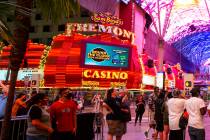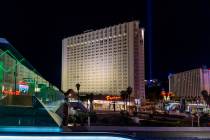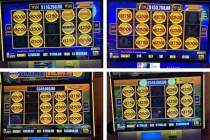Nevada lawmakers weigh impact of sports-betting kiosks on gaming industry
Sports betting kiosks have been around since 2004 and are now as common in Nevada as tabletop slots in taverns and other restricted gaming locations.
Developed through a joint venture between VirtGame Corp., Multimedia Enterprises and United Coin, the ATM-like machines allowed customers to place wagers as long as they had money on account. Customers had to go to a sports book, however, to cash winning tickets.
Evolving technology today permits customers to deposit money, open or close accounts, and collect winning tickets at the kiosk.
But the Nevada Resort Association says the upgraded kiosks blur the line between nonrestricted gaming, such as hotel-casinos, and restricted locations such as taverns and restaurants.
Billy Vassiliadis, an NRA lobbyist and a principal of R&R Partners in Las Vegas, told legislators Wednesday that regulations governing restricted locations lack clarity and certainty when it comes to sports betting kiosks. He testified at a joint information hearing of the Senate and Assembly Judiciary committees in Carson City.
The veteran lobbyist argued that state gaming regulations require sports wagering to take place inside a traditional casino with an unrestricted license. He said permitting restricted locations licensed only for slot machines to operate a kiosk was creating a “de facto sports book.”
Vassiliadis said kiosks presented challenges for the industry, from blurring the lines between licenses to the impact technology has on the business.
He argued that the 42 percent of state tax revenues provided last year by nonrestricted hotel-casinos could be negatively impacted by a proliferation of kiosks.
“We believe the gaming standards in this state have eroded,” Vassiliadis said.
As of Dec. 31, 327,000 people were employed in the hospitality business, according to NRA data. He said the $2 billion to $7 billion investment needed to enter the hotel-casino business was far greater than the $500,000 to $700,000 needed to open a neighborhood casino or tavern.
“We are not trying to restrict competition; we are trying to have it defined,” he said. “We need rules. If we allow the proliferation of kiosks we could undermine the position of Las Vegas.”
Scott Scherer, a Holland & Hart attorney representing William Hill U.S., denied that kiosks threaten traditional race and sports books. William Hill and Cantor Gaming both offer sports betting kiosks to Nevada bars and taverns.
Scherer reminded lawmakers that there is “nothing stopping a person from placing a sports bet at a tavern using their smartphone.” In most cases, he said, that also keeps a gambler from making a trip to a traditional sports book.
William Hill’s licensing and revenue-sharing agreement with Golden Gaming Inc. ends in July. Golden Gaming owns PT’s Pubs, PT’s Gold and Sierra Gold Taverns.
The Nevada Gaming Commission originally approved a two-year license so industry representatives could weigh in on regulations and sports book policies.
Scherer told lawmakers if the revenue-sharing agreement is terminated in July, William Hill has the option of pulling the kiosks, applying for another license or changing to a flat fee. No commission approval would be necessary, he said.
William Hill operates kiosks in 82 restricted locations in Nevada.
Joe Asher, CEO of William Hill, told lawmakers that if they kill the kiosks, some customers won’t bet at all and others will bet offshore illegally.
“Our gross revenue (from kiosks) was $600,000 last year,” Asher said. “That’s the big threat to the nonrestricted industry?”
Contact reporter Chris Sieroty at csieroty@reviewjournal
.com or 702-477-3893. Follow @sierotyfeatures on Twitter.

















